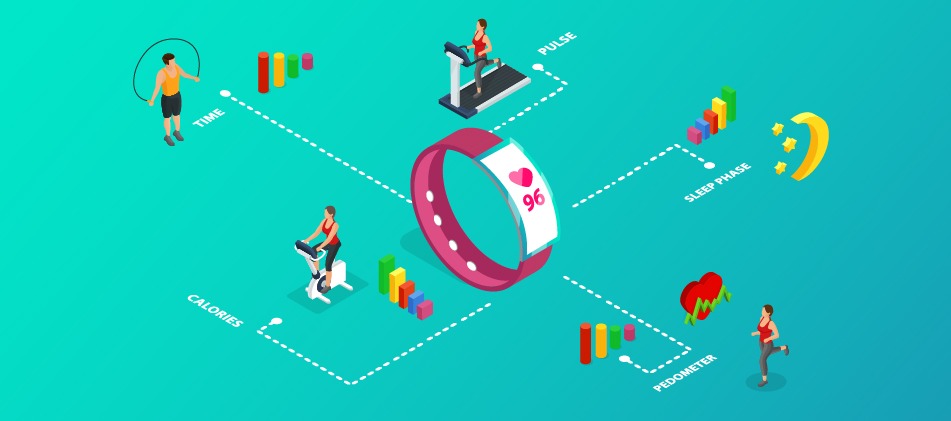
Smartwatches and other lifestyle accessories are around with us for quite some time now. Over the years the top Healthcare App Development Company has started shrinking the size of the software to create game-changing wearable devices for healthcare devices. These include sensor technologies that collect a wide range of variables that can be used to monitor or track the health of a person.
Smart Tech wearable refers to the healthcare gadgets that can wear humans to track down a range of health issues including ebb, the flow of brain waves and glucose levels, and other major things. With new technologies such as IoT, these wearables not just support the medical professionals but it improves the patient’s outcome as well, saving more lives in the processes.
According to recent reports, these wearables tech will worth $57 billion by the end of 2025. There are several challenges that wearable technology has solved in the healthcare industry. If you are willing to develop one for your hospital or nursing home then you need to seek the expertise of the leading Healthcare App Development Company.
Here are some challenges of healthcare that wearable technology solves. Several cutting-edge technologies over the years have made the work quite easy and devices such as battery life, making it more accessible for healthcare applications.
Notifications systems
With the use of Bluetooth, smart tech devices can exchange the data with other devices in the vicinity; thereby hospitals or other facilities to login with the device which is in reach. It can help to track a patient’s exposure a virus. These devices can also track other variables such as temperature other symptoms to help in monitoring the threat of this deadly virus.
Monitoring of Patients
Along with monitoring and notification of potential exposure these devices developed from a professional Healthcare, App Development Company helps to monitor non-critical indicators as well thereby saving precious time of healthcare professionals. For instance, wearable such as patient tags or wrist bands can track patient’s vital health parameters like temperature, blood pressure, and heart rate remotely allowing doctors to focus on the patients requiring immediate healthcare.
Tracking Equipment or Machines
The hospitals find it quite challenging to find the tracked location of medical equipment and machines as these assets are long term investments. With the usage of beacons or sensors, the location of all the major equipment can easily be traced, thereby saving lives and time.
On-site Navigation of facilities
In large hospitals, navigating the facilities can pose a huge challenge especially since GPS doesn’t work indoors there would be difficulty in finding the right room. So by placing beacons in various locations inside hospitals and other healthcare buildings patients can use their app on their smartphone to navigate through the building instead of waiting for the medical staff to assist them.
What are the perks of using Smart Weartech in Healthcare?
The Smart Tech wearable offers a range of benefits to our frontiers and patients as well such as prevention and maintenance of health conditions, more efficient patient management as well as disease management.
Patient Management
Healthcare wearable devices can help to make patient management more effective in hospitals by remote monitoring of several categories of patients to improve the care and health outcomes
Disease Management
Challenges posed by Wear Tech Devices in Healthcare
Acceptance by users
The overall success of healthcare variables in providing an inexpensive and more efficient alternative to hospitalization depends mostly on good users who will accept these devices in both clinical and home environments. The advanced sensor technology is of no use for the patients if the healthcare service providers themselves reject it.
From a patient’s perspective, the devices should be comfortable to use and should not affect their daily life. Healthcare professionals should see these benefits in their daily tasks and improves overall efficiency.
Privacy and Security
Since these wear tech devices take huge data from the individual, patient confidentiality and data security remain a huge concern especially with the need for compliance with HIPPA regulations.
Ethical Issues
While Smart wear Tech offers the opportunity of measuring and customizing an individual’s experience in social and home environments, they also raise several concerns. For example, the method to collect data and variables for conceptualization and interpretation might be intrusive and often unauthorized.
How Smart Tech Devices unfold the future of the Healthcare System?
Despite some challenges that these magnificent devices are likely to face until they gain great acceptance from the users. Over the years, some wearable devices are demonstrating how they can contribute towards making healthcare more efficient. Let’s see how these can transform the future.
Personal Devices
These pocket-size healthcare devices can record several healthcare variables like heartbeats etc and send them to the Smartphone within 30 seconds allowing healthcare professionals to review the patient’s condition instantly.
Women’s health and well-being
The devices are worn on patient’s skin are absolutely non-invasive, it records great variables like heart rate, ECG which can be sent to the healthcare practitioners for analysis and diagnosis.
Wireless Monitoring
In critical situations where hospital beds are very high in demand, the prospects of monitoring of those patients who require immediate healthcare help, smart tech wearable can easily track down all the latest activities and can transmit the data to healthcare professionals for straight away diagnosis and treatment.
Conclusion
Undoubtedly, wearable healthcare devices are paving the way to the future of healthcare. With more and more companies startups working on developing advanced technology solutions to provide quality services to their customers, this technology can easily remove the burden and can reduce the current challenges by minimizing the human intervention into it.
To know more regarding game-changing healthcare you can connect with our experts at info@b2cinfosolutions.com




